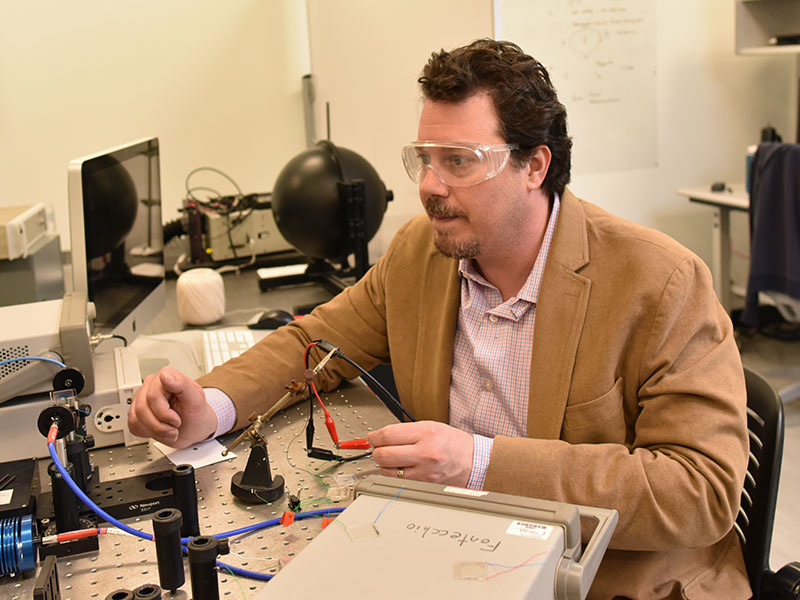Adam Fontecchio, PhD, an advocate for and expert in STEM education and teacher training, has been elected as the next Director of the Center for the Integration of Research Teaching and Learning (CIRTL), effective July 1.

Adam Fontecchio
Fontecchio, professor of electrical and computer engineering in Drexel’s College of Engineering, took over as acting director of CIRTL beginning on March 1, succeeding founding director Robert Mathieu.
CIRTL is a network of 42 research universities in the United States and Canada providing evidence-based, forward-thinking professional development to students at the graduate level. The goal of CIRTL is to improve the STEM learning of all students at every college and university, and thereby to increase the diversity in STEM fields and STEM literacy of the nation. CIRTL was founded at the University of Wisconsin-Madison, in collaboration with partners at Michigan State University and the Pennsylvania State University in 2003 as a National Science Foundation Center for Learning and Teaching in higher education.
Fontecchio is also inaugural director of Drexel’s Center for the Advancement of STEM Teaching and Learning Excellence (CASTLE). Founded in 2014, CASTLE also aims to improve STEM education by conducting research and implementing best practices across curricula. The center has been a consistent hub of funded research at Drexel.
CIRTL’s approach centers on preparing PhD students to run a classroom. Fontecchio says that the group’s research addresses a gap in the way that doctoral students are taught.
“When students get a PhD, they then often go on to a faculty job, but getting a PhD is primarily and necessarily technical training — how to write papers, do research, write grants, professional conferences,” he says. “CIRTL tries to fill in the other parts: what do you do in a classroom, how do you build a class, how do you evaluate your class and know that what you're doing is working?”
Fontecchio says that, ultimately, the work of CASTLE and CIRTL is to make STEM education more accessible to more people.
“My work in this area began more than 20 years ago, when Eli Fromm knocked on my door and asked me to co-write a proposal for an NSF grant on K-12 STEM education where we’d put PhD students in middle schools to teach them how to talk to the public,” Fontecchio recalls. “By improving the way that STEM curricula are developed and analyzed, we can make STEM education more approachable and equitable. In time, that opens up opportunities for more diversity in STEM fields.”
The election of a new director marks a major milestone in the history of CIRTL as the organization completes its transition from a PI-led research project to organization operating under a new Constitution and Bylaws. Fontecchio says that, while CIRTL’s physical headquarters will remain in Wisconsin, the transition for both himself and the organization will be relatively seamless.
“When the first outside organizations joined CIRTL, it was easy for them to travel between each other, because most of them were in the Wisconsin/Michigan area,” he says. “But very quickly, as more institutions joined and the scope became national, many of CIRTL’s functions became virtual. We held online meetings, developed Massive Open Online Courses (MOOCs) for members to participate in…the network has been doing great virtual work for more than 18 years.”
One of Fontecchio’s goals as director is to build on the network’s virtual capability to expand its reach.
“As a network, we want to see how we can bring in more membership from HBCUs and other minority-serving institutions,” he says. “We are also looking into making more connections with community colleges, which may seem odd for a group that was founded on high PhD-producing institutions, but if you think about our mission to train faculty to make STEM more accessible for a diverse audience, we should be doing that wherever STEM is taught.”
CIRTL will also look to help faculty who have started teaching since the onset of the pandemic.
“What you’ve had over the last two years is these junior faculty who finished their PhD programs and immediately started teaching in a virtual environment, and now that students are back in person, they aren’t as well prepared for that” Fontecchio explains. “What we’re considering is taking this robust training and self-evaluation cycle that we’ve built and apply it to junior faculty so they can learn in real time how effective their teaching methods are.”
Locally, Fontecchio says that he hopes his leadership position brings more visibility to CASTLE and CIRTL’s programming at Drexel.
“We have a lot of classes and offerings here at Drexel through CASTLE that can be very beneficial to any graduate student or postdoc who is on the track to become a faculty member somewhere,” he says. “And while CIRTL and CASTLE were developed by and for STEM faculty, let’s just say that we don’t check your STEM ID at the door. Everyone is welcome to participate and learn how to become a better educator.”